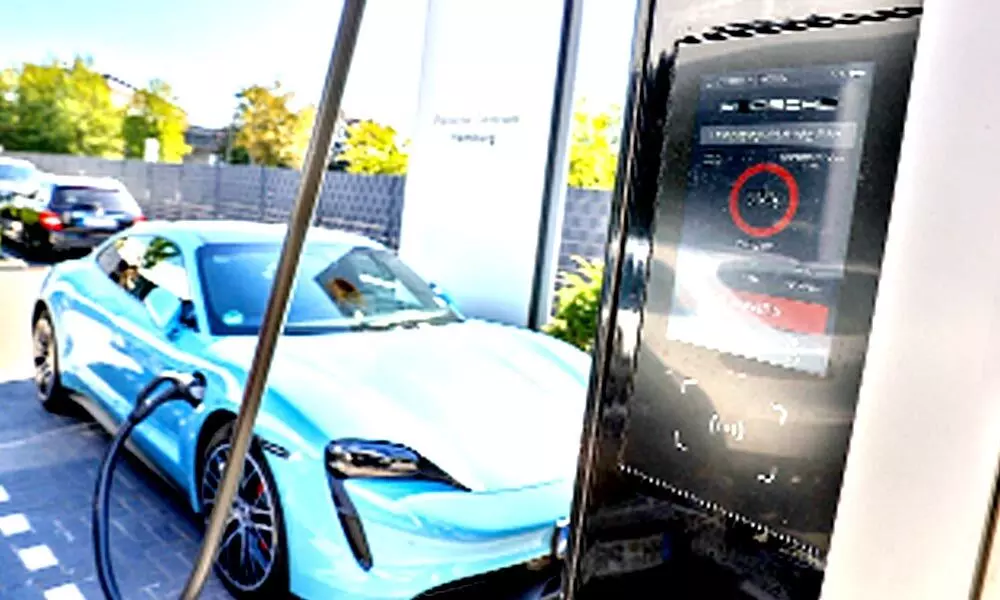Will South Korea lead next EV battery supply chain race?
Scientists in South Korea are now playing with battery architecture and chemicals to make ambitious bets on what may ultimately lead to a more realistic path to mass electrification
image for illustrative purpose

Everyone is looking for new ways to get a piece of the global electric vehicle value chain. It's no longer just car companies or battery firms, it's the entire range of parts that make up batteries - from the chemicals that form each component to the wiring and everything in between. With all the noise around battery technology, though, it's hard to wade through the futuristic bets to find the realistic ones. There is one country that could prove to be a happy hunting ground: South Korea.
While companies there took an early lead in cutting-edge EV battery technology, they were quickly overtaken, mainly by Chinese competitors that outdid them on scale and size. The likes of LG Chem Ltd's LG Energy Solution and Samsung SDI Co have all shown promise, but their global market share has waned. They may be set for a comeback.
Scientists have spent decades working to improve lithium-ion car batteries, while lowering their cost. In South Korea, they're now focused on all the materials that can be used in various parts of a power pack by playing with existing chemicals and battery architecture.
Even with 90 per cent nickel batteries - the latest attempt to use high-nickel content to expand staying power - recently showing a way to commercialization (by South Korea's SK Innovation Co), further progress is looking limited and the goal of mass electrification remains distant. That's because such batteries, accounting for around 50 per cent of the cost of an electric car, remain too costly due to production processes, expensive or hard-to-source materials and the fact that we haven't mastered the chemistry to make them completely safe. Manufacturers are constantly having to play off competing priorities like size for energy density, or range for safety.
To address these pressing issues, companies have tended to look past what's in front of them and put ambitious bets on untested technologies that could work in theory, but only at some point way into the future.
There's all sorts of research on further-away technologies out there, but so far, the development of viable power packs has focused on the material of the cathode, or the electrode, which accounts for around 40 per cent of the material costs. In doing so, they've concentrated on increasing the nickel content in nickel-manganese-cobalt, or NMC, batteries that have shown the greatest promise in terms of energy density. These can take cars the furthest, but their safety isn't guaranteed and the price hasn't come down enough to make green cars more affordable than the traditional ones.
That's where the other electrode comes in, or the anode, the component South Korean companies have set their sights on. This part is predominantly made of graphite. As cathodes hit their limits of energy density, chemists are now looking for materials that could make the anode more efficient. This will determine key factors for electric cars, like how fast they can be charged, and make more practical battery technology for the cars that - sooner or later - we will all have to drive.
For the next, realistic step toward a new generation of power packs, it's worth looking at materials that will boost anodes. Silicon-based compounds have become central to this research because this material can capture more lithium ions than graphite, and it is the second-most abundant element in the earth's crust, analysts at Daiwa Capital Markets Hong Kong Ltd note.
While silicon still has issues when used in batteries, companies like South Korea's Daejoo Electronic Materials Co. that supply to chemical giant LG Chem's battery unit LG Energy Solution have developed advanced composites to make the technology more usable. They're now providing batteries to Porsche Automobil Holding SE's electric Taycan. Another firm, Hansol Chemical Co., has invested 85 billion Korean won ($71.6 million) to build plants that make silicon-carbon based anodes. It shows there are other, realistic paths to electrification than the trade-offs and challenges manufacturers are currently contending with. South Korea's battery makers do run the risk of getting left behind when it comes to scaling the technology, as they did last time around. Ultimately though, as daunting as getting into the basic science of batteries may seem, it's where the real progress is likely to happen. And the country's firms seem to know that. (Bloomberg)

